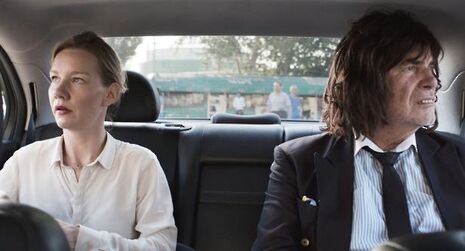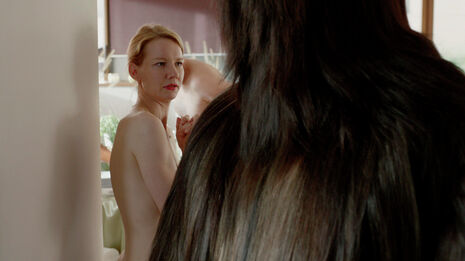Review: Meet ‘Toni Erdmann’: performance consultant, German ambassador… dad.
Maren Ade’s film is an introspective look at familial responsibility and emotional self-examination finds Film and TV Editor, Pany Heliotis

Toni Erdmann is a farce told in real time. Jokes are stretched beyond their expected punchline, exacting their laughs by attrition. In a film about emotional examination and rejuvenation, this forceful commitment to the awkward melds each joke into a probing question as well as a simple grasp for giggles. The space between guffaws becomes a pause for meditation and self-confrontation in a story of a father ‘acting’ to save his daughter, the Toni Erdmann persona designed to penetrate her existential solitude.
“Just as when the clown puts his nose on it becomes safe to laugh at him and him you, Erdmann’s false teeth and wig give Winifred licence to mend”
Naturally, a film so committed to the protracted needs performances that keep the audience attentive through the lulls. Peter Simonischek and Sandra Hüller do this with aplomb. Simonischek’s Winifred/Toni Erdmann is an exercise in geriatric eccentricity, the corner of his mouth curling to the side of his face with every tasteless and childish joke his alter ego makes. It is a façade that marks a well of concern for his ailing daughter. Just as when the clown puts his nose on it becomes safe to laugh at him and him at you, Erdmann’s false teeth and wig give Winifred licence to mend: pacifying the ‘distant father’ in favour of the primal protector. Aghast at the subdued horrors his daughter encounters amid a toxic corporate landscape, the ironised persona allows him to manage the shock.

This paternal transfiguration reaches its apex when Winifred acquires a Bulgarian Kukeri costume (essentially a walking clump of hair with an enormous hairy phallus protruding out of the top) designed to ward off evil spirits. The sight of this hirsute eyesore in a spare Bucharest apartment is a semiotic treat – the archetypal protector ostentatiously intruding on the domestic.
But Maren Ade’s film is not about Toni. This is Hüller/Ine’s film, Erdmann merely a surrogate for our inquiry. Hüller masterfully captures the stoic suffering of the ambitious career woman, suffering everyday misogyny with a mask of rigid compliance. But this is not a victimised portrait of a woman struggling under patriarchal pressure. Hüller’s letter box eyes flap open with quiet fury at every sexist slight she encounters, the character later exacting revenge in puerile and provocative ways traditionally associated with her male counterparts. I won’t spoil anything but to say this: ‘soggy petits fours’. This is not a character to be pitied but rather to be angered and sympathised with.
This is all down to Maren Ade. The writer/director subverts the male gaze, de-eroticising the female form in scenes characterised by a kind of comedy vérité – the body contorted in discomfort and saturated by natural light. Her deft hand allows the comedy to gently hum in tandem with the story, never overshadowing the drama. A scene where the Erdmann character observes his daughter at dinner is shown completely from Ines’ perspective; she in the foreground as the character encroaches, out of focus, into the frame. Erdmann is a fiction, kept a blur, a guardian angel that only we and she can see. Like Drop Dead Fred. But, well, real…ish. The scene is both funny and poignant, Ade’s formal restraint trusting the action rather than drawing attention to itself.
Toni Erdmann is a treat for anyone who likes their laughs hard-earned and true. Go watch it with your Dad or your Mum, and be thankful for their watchful eye.
 News / SU reluctantly registers controversial women’s soc18 December 2025
News / SU reluctantly registers controversial women’s soc18 December 2025 News / CUP announces funding scheme for under-represented academics19 December 2025
News / CUP announces funding scheme for under-represented academics19 December 2025 Features / Should I stay or should I go? Cambridge students and alumni reflect on how their memories stay with them15 December 2025
Features / Should I stay or should I go? Cambridge students and alumni reflect on how their memories stay with them15 December 2025 News / Cambridge welcomes UK rejoining the Erasmus scheme20 December 2025
News / Cambridge welcomes UK rejoining the Erasmus scheme20 December 2025 Science / ‘Women just get it more’: autoimmunity and the gender bias in research19 December 2025
Science / ‘Women just get it more’: autoimmunity and the gender bias in research19 December 2025









